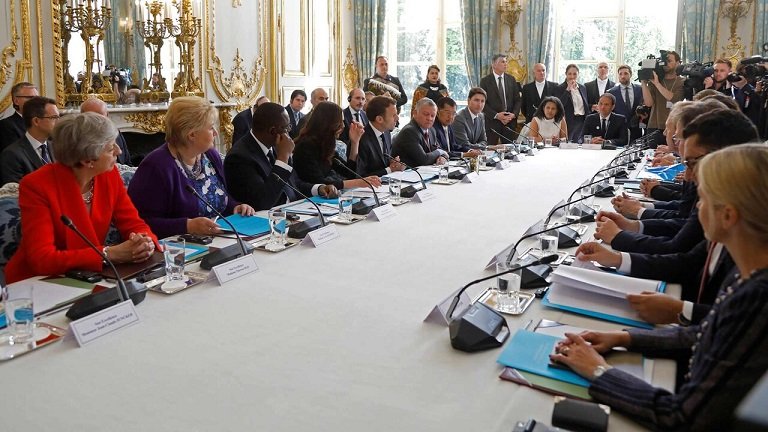
Expression
Civil society raises concerns about “Christchurch Call” process
On 15th May 2019, seventeen governments led by New Zealand, and eight major tech companies including Facebook, Microsoft, Google and Twitter, signed and published the 'Christchurch Call', a voluntary pledge with commitments aimed at eliminating terrorist and violent extremist content online. The Call follows the tragic terror attack in Christchurch in early March 2019 in which 51 people were killed and dozens injured in attacks on two mosques.
While civil society groups broadly support the key values of the Call including the protection of human rights and fundamental freedoms to ensure a free, open, and secure Internet there are also some concerns. Relevant CSO stakeholders have highlighted a range of issues with the Call including the lack of consultation with civil society and fears over an inadvertent curtailment of freedom of expression online.
According to the civil society group, Access Now, in a move to increase transparency, New Zealand Prime Minister Jacinda Ardern, convened a meeting in Paris for civil society called Voices for Action. However, this meeting took place only a day before the Christchurch Call was released. The objective of the meeting was for civil society stakeholders to provide input into how the Call should be implemented, rather than seeking feedback on the substance. In fact, those attending were only given the text of the Call just two working days before the meeting took place.
Other civic space related concerns include:
- The lack of a definition of “terrorism and violent extremism” that could be interpreted differently by states. CSOs urged government to commit to robust accountability and oversight to ensure that laws, mechanisms, and other initiatives to combat terrorism online do not result in disproportionate human rights violations of political critics, human rights defenders, journalists, ethnic or religious minorities, refugees, asylum seekers, and migrants;
- The Call focuses primarily on putting the responsibility for identifying and removing violent extremist content on internet companies. CSOs argued that while these companies do have a key role to play, governments should not outsource the regulation of speech to private entities, as doing so removes principles of due process and government accountability. Users deserve a clear, predictable, and human rights-compatible framework for the protection of their freedom of expression online;
- There is also concern that the commitments made by tech companies and governments were based on closed-door discussions and on what these parties choose to commit to, where there are broader societal discussions about the appropriate roles of the government and the private sector on these issues, and where views differ greatly on the appropriate roles for each;
- The process and timeline of the Call was a problem in and of itself, including concerns about the siloed approach to negotiations and the exclusion of civil society, academic experts, journalists and news media representatives, and the technical community.
In a statement, Javier Pallero from Access Now said:
“Any attempt to set policies or binding regulations that impact online speech will be successful only if it is truly inclusive and genuinely garners insight and expertise from civil society, something that the Christchurch Call disappointingly fell short of.”
Peaceful Assembly
Students protest demanding action on climate change
School students in @Australia and @NewZealandToday @newzealand have gone on strike, marking the start of a worldwide day of climate change protests, inspired by @GretaThunberg.
— WateteziTv_International (@WateteziTv_Int) May 24, 2019
The protesters are calling for politicians and businesses to take action to fight climate change. pic.twitter.com/pWWN59vABZ
On 24th May 2019, thousands of students around the country organised another protest to demand urgent action on climate change as part of a worldwide movement. The students mobilised to stop the use of fossil fuels and to urge the country to use more renewable energy sources. They accused the government of not doing enough to stop global warming and boycotted school to highlight their concern over climate change.
In the capital Wellington, students gathered in Wellington's Te Ngākau, Civic Square, before marching through the streets to Parliament. The crowds shouted, "No more coal, no more oil, keep your carbon in the soil", calling for "Climate justice" and drastic action by political leaders to enforce change. Auckland students gathered in Aotea Square ahead of a lie-in at Aotea Square and a march down Queen Street. Others picked up shovels and rubbish instead, planting trees and cleaning up beaches as part of the nationwide movement.
50,000 teachers strike for better wages and conditions
Tens of thousands of New Zealand teachers walked off the job in protest today. #NewZealand #TeacherStrikes pic.twitter.com/t7t0bTdw2r
— Global Analytica (@AnalyticaGlobal) May 29, 2019
On 28th May 2019, more than 50,000 primary and high school teachers went on strike to march and rally in the biggest industrial action ever seen in New Zealand’s schools. Since a Labour coalition government took power in late 2017, teachers have held three strikes calling for pay rises, better working conditions and more respect for their profession.
So far, the protesters have turned down three pay rise offers from the government of 3%, and say they want 15% or more to continue their work. Despite their protest, the government claims it has no more money to give.
In Auckland, the thousands of teachers began their march to Aotea Square, the country's largest rally for the day. Among the crowd of several thousand teachers held placards, one reading "Time to use our outside voices". In Christchurch teachers marched to the Ministry of Education in West End where Post Primary Teachers' Association (PPTA) President Jack Boyle told the crowd, teachers were united and would not stop.
Lynda Stuart, president of NZEI Te Riu Roa, the union that represents primary school teachers, said the sector was in “crisis”. Teachers were being forced to care for too many students, and were bogged down by excessive paperwork, pastoral care obligations, large class sizes and not enough funding for special needs students.